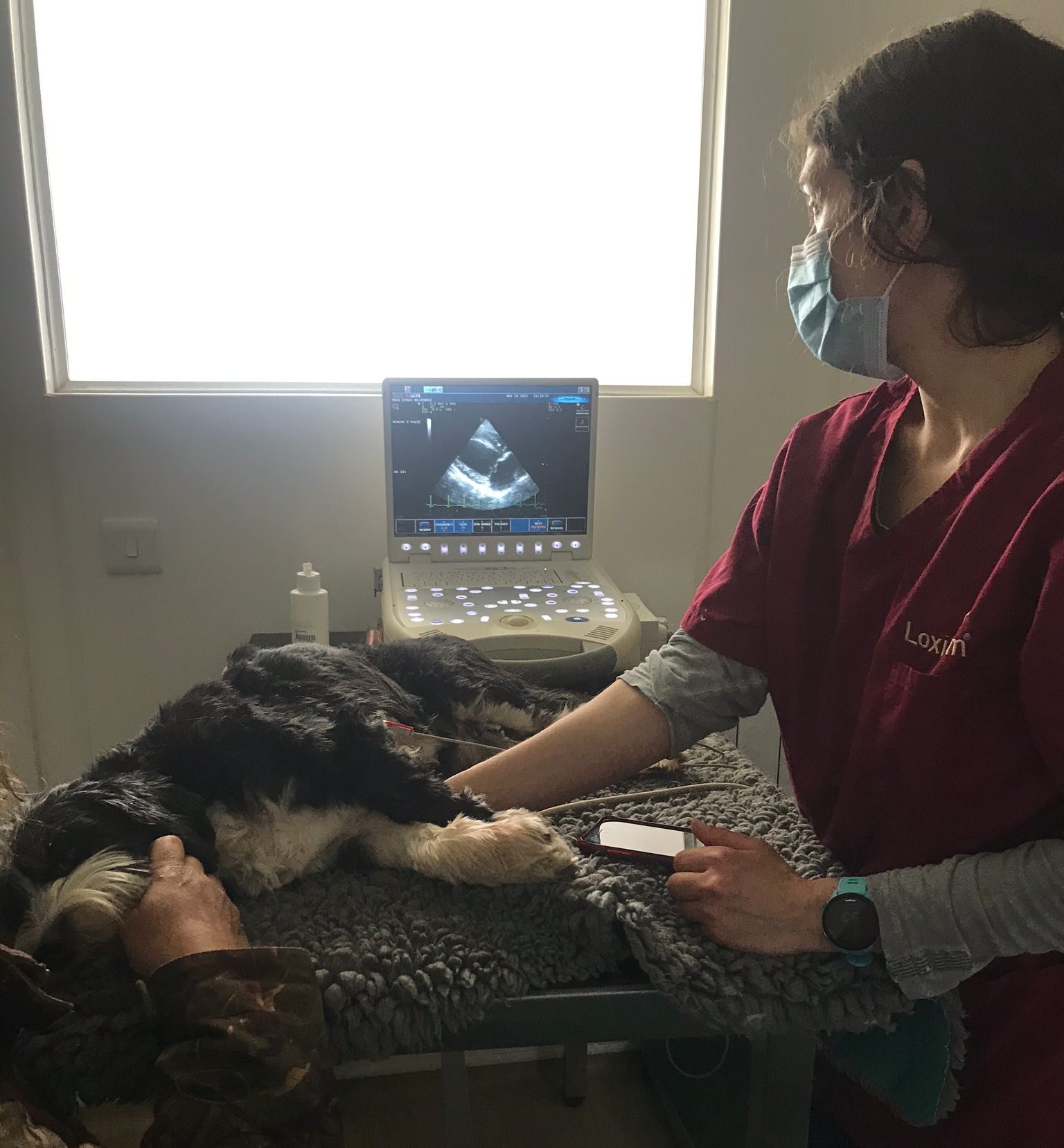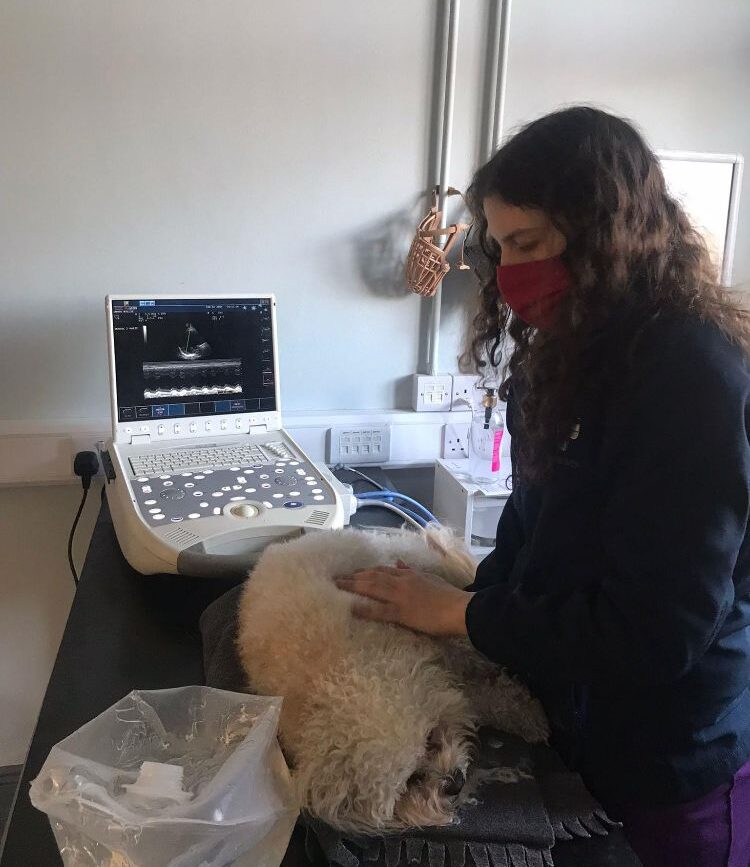Project Description
Having a Heart to Heart…
The heart is a muscular pump which consists of four chambers. These four chambers are divided by valves on the left and right sides of the heart. The valves assure that blood flows in the correct direction: less oxygenated blood travels from the right side of the heart through the lung, picks up more oxygen, and travels through the left heart into the aorta and around the body. Heart conditions can be congenital (the animal is born with it, for example with a hole in the heart) or acquired (a condition that develops with age). Improved veterinary care has led to more diagnosed heart conditions in pets. With pets becoming more integrated into family lives, it is only natural that pet owners want to take advantage of the diagnostic tools and advanced treatment options that are available up to date.
-
023 8841404 (Landline)
-
023 8841404 (Emergency)
-
Station Road, Bandon, Co. Cork, Ireland P72FY72
-
021 4772277 (Landline)
-
023 8841404 (Emergency)
-
1 Church Square, Kinsale, Co. Cork, Ireland.
-
Bridge street Dunmanway Co Cork Ireland P47FN36
-
026 41055 (Landline)
-
Sawmill Yard, Macroom, Co. Cork, Ireland.P12EY80
Areas of the heart that may be affected:
Heart Valves: These may develop abnormally or degenerate (“shrivel up”) over time. Leaky valves do not close properly (for example degenerative mitral valve disease- DMVD) and stenotic valves do not open properly and obstruct blood flow (for example aortic stenosis). The abnormal blood flow creates a murmur that your veterinarian may hear with a stethoscope and this can also be seen on ultrasound.
Heart muscle: The most common heart muscle disease in dogs is dilated cardiomyopathy (DCM). This condition leads to the weakening of the heart muscle. The heart is less efficient in pumping which leads to blood pooling and leads to the dilation of the heart.
Electrical conduction disturbance: An abnormally slow, fast and/ or chaotic heart rhythm leads to circulation issues and affects the heart muscle itself in later stages. An abnormal rhythm can often be detected during a clinical examination but a veterinarian needs an electrocardiogram to diagnose which abnormal rhythm is present.
Pericardium: The pericardium is a sac that surrounds the heart. Changes within the sack prevent the heart from stretching and filling properly. The most common heart conditions in dogs are DMVD (degenerative mitral valve disease) and DCM (dilated cardiomyopathy).
DMVD: This leaky valve syndrome commonly affects small breed dogs, especially Cavalier King Charles Spaniels, and Terriers.
DCM: This is a condition that affects mostly large breed dogs (such as Newfoundlands, and Boxers) but Springer Spaniels can also be affected.
Cats and ferrets often present with cardiomyopathies (heart muscle disease) such as hypertrophic cardiomyopathy. Heart disease does not always lead to heart failure or a reduced life span. Often the heart and body can compensate for small changes, such as a leaky valve. In an early stage of heart disease owners might not even notice that the dog has a heart condition. Only in later stages when the heart enlarges, the owner may notice exercise intolerance, coughing or breathing problems at rest when fluid accumulates on the lungs (if in left-sided heart failure) or when his belly enlarges due to free fluid in the abdomen (if in right-sided heart failure). Ultrasonography will provide the owner with more information regarding the condition and staging of heart disease. It may also give a rough prognosis and will answer what treatment is necessary if any.


About The Veterinarian:
Denise Philpott qualified in Berlin in 2006 from the Free University. She has worked in General and Referral Practices in both England and Ireland ever since, completing a certificate in Advanced Veterinary Practice focusing on Cardiorespiratory Medicine, in 2014.
Apart from a keen interest in Cardiology and in particular Echocardiography, she also has an interest in Internal Medicine and Dentistry.
In her free time, she enjoys running, swimming or anything fast-paced. Denise has 2 young children and a menagerie of pets at home ( a dog, cats, birds and fish).


The services we offer:
- Heart scan
- Doppler echocardiography
- Six lead Electrocardiogram
- Radiography
- Electrocardiogram (ECG)
- Bloods
- Blood Pressure monitoring
- X-rays
How the Process works:
When a heart condition is suspected, your veterinarian can refer you to Denise at Glasslyn Vets for an Ultrasound. After a consultation, a full heart scan will be performed where you are encouraged to be present to comfort and assure your pet. If needed, bloods might be taken, blood pressure might be monitored and/or X-rays might be needed. Sedation might be needed but usually, we try without.
A full report will then follow within 24 hours to you and your referring Veterinarian. This report will include the findings and a recommended treatment plan.

